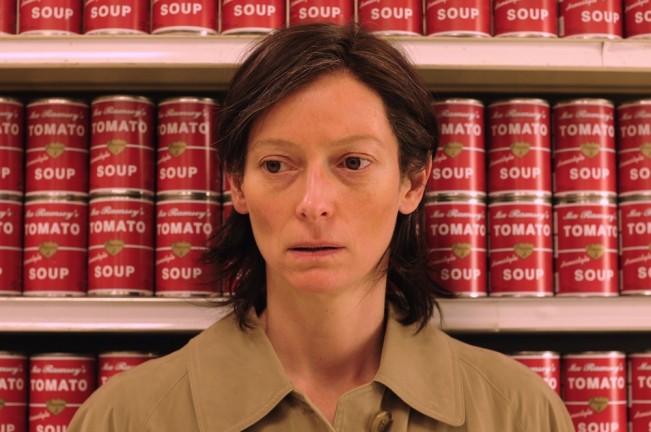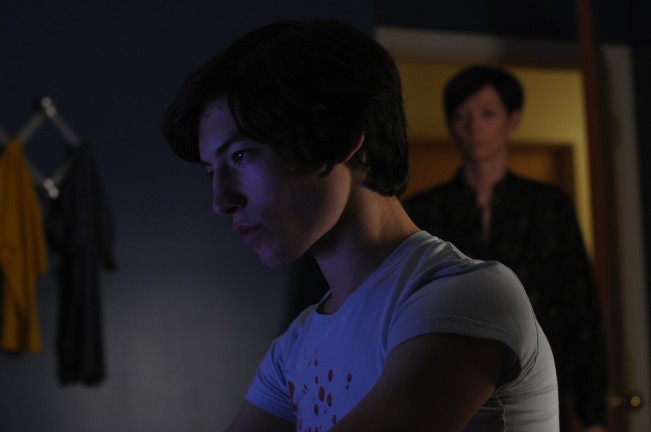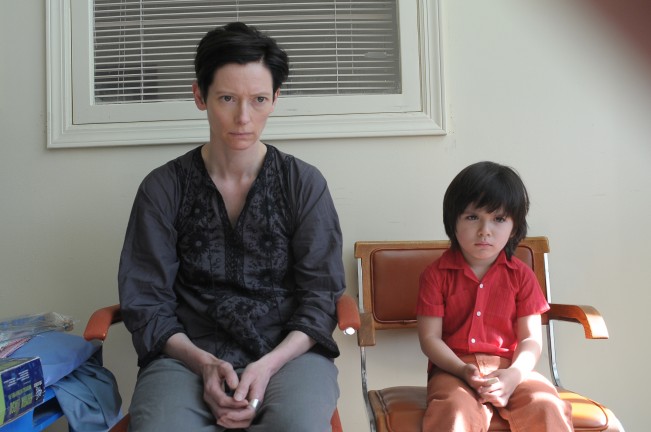

By Mike Wilmington Wilmington@moviecitynews.com
Wilmington on DVDs: We Need to Talk About Kevin
By Mike Wilmington
PICK OF THE WEEK: NEW
WE NEED TO TALK ABOUT KEVIN (Also Blu-ray) Three and a Half Stars
U.S.: Lynne Ramsay, 2011 (Oscilloscope)
I. We Need to Talk
The movie, a real horror movie that really horrifies, is called We Need to Talk About Kevin. Based on the novel by Lionel Driver, it was directed and co-written by Lynne Ramsay, the Scottish filmmaker who also made Ratcatcher (1999) and Morvern Callar (2002). Her films, sometimes set in poverty (like Ratcatcher), sometimes on the fringes of society (like Morvern Callar), often dealing with death and guilt and morality, are grim — none grimmer than this one, which takes place in comfort and suburban ease, a scary movie about the pain of bourgeois parenthood, a noir in sunlight.
Here is what horror is, or can be — not the artificial fictional terror horror of a maniac running wild with a chainsaw, or a corpse rising from the dead to feed on the living, or the devil or ghosts attacking and devouring a soul, or monsters from outer space devouring humanity, or any of the other mostly overused, mostly underthought clichés of the popular horror movie — but instead something that could actually happen, maybe next door, maybe to people you know (or think you know), people living a human, credible nightmare in a sunny, expensive, suspiciously bare American suburban home. A mother, a son, a father, a daughter. We watch them. We watch it all (or the mother watches it all, from the “safe“ vantage point of memory), as she scrapes red paint from the white front and door of her home, paint that is meant to signify blood — blood that someone has shed..
 How did it all begin? How does any life begin? The father marries the mother, impregnates her. They seem like nice people. But she didn’t want the baby. Maybe she doesn’t want to be married, or wants to continue her exotic single life in New York City and around the world as a travel writer. It’s a hard childbirth. Something is wrong. The son is either a late bloomer, or damaged, or perversely stubborn. He talks late, is toilet-trained late, ignores his parents when they try to instruct him, lets his mother toss a ball to him on the floor, but makes no attempt to catch it. He is unkind, selfish, cruel, a real little bastard, amused by the chaos he creates.. But he‘s not abnormal, says a doctor. In fact, he’s smart. Maybe too smart.
How did it all begin? How does any life begin? The father marries the mother, impregnates her. They seem like nice people. But she didn’t want the baby. Maybe she doesn’t want to be married, or wants to continue her exotic single life in New York City and around the world as a travel writer. It’s a hard childbirth. Something is wrong. The son is either a late bloomer, or damaged, or perversely stubborn. He talks late, is toilet-trained late, ignores his parents when they try to instruct him, lets his mother toss a ball to him on the floor, but makes no attempt to catch it. He is unkind, selfish, cruel, a real little bastard, amused by the chaos he creates.. But he‘s not abnormal, says a doctor. In fact, he’s smart. Maybe too smart.
Here is what is happeneing — maybe. The mother dislikes or resents her son. The son resents or hates his mother. She tries to teach him; he tries to frustrate her. The father misunderstands everything and thinks the son is a sweet little boy and the mother maybe delusional. The daughter is tormented by the son, scarred by his sadistic pranks. He is not just bad; he seems evil. But this is just the beginning. The worst is yet to come.
The family are called the Khatchadourians — which suggests the name Aram Khatchaturian, the Russian composer of the Saber Dance. The mother is Eva (played with a beautifully controlled fine-boned chill of guilt and anxiety by Tilda Swinton). The father is Franklin (John C. Reilly, who makes him a big warm good-hearted shaggy teddy bear of a guy, with a sometimes ugly expression). The daughter, the youngest, is Celia (played by Ashley Gerasimovich as a little darling whom nobody should hurt). The son is Kevin, played as a child by Rock Duer, as an elementary school boy by Jasper Newell, and as a teenager by Ezra Miller. An unholy three, they all freeze your blood at times — partly because they’re playing something close to pure evil, partly because they show us how evil can function, why it can sometimes outsmart good. And partly because they’re all so cute.
 Certainly Kevin is at his cutest when he finally listens to Eva, as she reads him the tale of Robin Hood, champion Saxon archer — and his father, whom Kevin plays like a bassoon, later buys him a bow and arrow, and he becomes a crackerjack archer, who can always hit his target. (“Don’t miss much, do I?” said Martin Sheen, as Kit, the Charles Starkweather type, in Badlands.)
Certainly Kevin is at his cutest when he finally listens to Eva, as she reads him the tale of Robin Hood, champion Saxon archer — and his father, whom Kevin plays like a bassoon, later buys him a bow and arrow, and he becomes a crackerjack archer, who can always hit his target. (“Don’t miss much, do I?” said Martin Sheen, as Kit, the Charles Starkweather type, in Badlands.)
Hitchcock said that he thought his movie villains should be attractive, because otherwise it would be hard to understand how they could get so close to their victims. (Maybe he was thinking also of the beauty of the cinema, of how close it can get to us.) Kevin has pretty-boy looks in an exotic dark-eyed Keanu Reeves sort of way — and in certain ways, he looks, more and more as he grows up, like Eva. He‘s his mother’s son, but he doesn’t play her game. And he’s so beautiful that people — notably Franklin — let him get away with murder. He’s a narcissist who imagines that all the world is watching him, or wants to. We don’t see Kevin’s friends, either male or female, at school — a flaw in the film, though not in the book — but we imagine he has followers and admirers, and that he plays to them, as he plays to Eva.
The movie goes back and forth in time, in the oblique narrative style favored by Ramsay. It begins with a huge, sensuous overhead scene of a vast writhing mob of people, all covered in red, Eva among them, ecstatic as she’s transported yjrough the wet, scarlt bodies, in a celebrated Spanish event, the tomato festival (“La Tomatina”). After this, Red becomes a lietmotif of the film, which even backgrounds Eva with tomato soup cans. And throughout, she keeps scraping away at the red paint on her home, the symbolic blood on her door. In the movie’s “present,” she’s a pariah of the town. She gets a job as a secretary at a travel agency, endures rude advances from a co-worker (Alex Manette). She is slapped by a stranger. People blame her for whatever it was that Kevin did. What was it?
SPOILER ALERT
We keep looping back, but when the worst horror of all finally comes, Ramsay doesn’t even show it — only the wicked smile on Kevin‘s face as he surrenders to the police. The last scene, a year later, is a meeting with his mother. He looks ashen; she looks composed. Maybe he didn’t hate her after all. Maybe she didn’t reallu hate him. But…
END OF SPOILER
2. Why
In some ways, I didn’t really like We Need to Know About Kevin; in fact, I found the whole movie profoundly disturbing. But sometimes, art should disturb and a horror film should really horrify, even if it averts its own eyes, and ours. This one IS certainly a work of art, and a horror tale that gets to you. Lynne Ramsay is a fine, deeply accomplished filmmaker, who shouldn’t have had to wait ten years between her last two films, and the cast is a splendid one, particularly Tilda Swinton, who soaks up your attention like a blotter, and whose pale, well-sculpted face and quiet tense delivery — like Ezra Miller‘s — cuts into your mind.
Everything about the movie seems carefully thought out, carefully sculpted and impeccably finished. In fact, that’s my problem with We Need to Talk About Kevin: in a way, it’s too artificial and too carefully crafted for me, the dialogue too minimlist, the color too co-ordinated, the characters and events too symbolically arranged, the paint too carefully applied. I like movies, or other kinds of art, where the life bursts through (as it does here in the Tomatina scene) — or sometimes, by contrast, where that life is so carefully contained, so stylized, that you have to try to find it yourself, scraping away the red.
Life does burst though in We Need to Talk About Kevin (and so does death) but, for my taste sometimes, not enough. Yet the film has extremely powerful moments and so does its cast, When horror becomes human, as it does here — something happening next door, something we need to talk about — it strikes more cruelly, wounds more deeply.
EXTRAS: Featurette with interviews with Ramsay, Swinton, Miller and others; Additional footage from the “Tomantina” Festival; Swinton in conversation at Telluride; Interview with novel author Shriver; Trailer.














